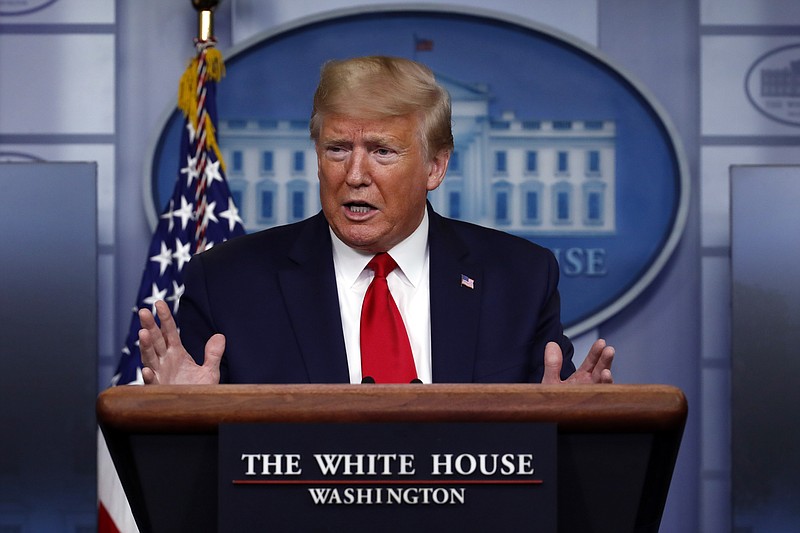Americans are rapidly losing faith in President Donald Trump's handling of the coronavirus outbreak, according to national polls released over the past week.
What's more, some of that drop-off is occurring among groups that Trump will need to retain as he looks ahead to a difficult reelection battle in the fall.
Older voters broke for Trump in 2016, and they are seen as crucial to a potential victory for him in November. But their approval of his job performance has been middling throughout his presidency -- and with the oldest Americans now particularly endangered by the virus, they may be watching his response to the pandemic closely.
Just 43% of people 65 and older said they thought Trump was doing all he could to confront the outbreak, according to a CNN poll released this week. Fifty-five percent said he could be doing more. By comparison, Americans ages 50-64 -- who tend to see Trump more favorably overall -- were more likely to say he was doing what he could.
And while it is typical for registered voters to skew slightly more conservative than the overall population, that trend disappears when it comes to views of the coronavirus response.
Registered voters were considerably more likely than nonvoters to give the federal government's handling of the crisis a bad review, according to the CNN poll. Fifty-seven percent of voters rated it poor, while 39% gave it positive marks.
"I think what recent polling has suggested is that while he's kept his base satisfied, he has turned off a lot of people, especially elderly voters, who are frankly a little bit scared by what they're hearing at the podium every night," Jim Manley, a veteran Democratic strategist, said, referring to the president's freewheeling daily news conferences.
In any election, different types of voters are likely to be swayed by different factors. Liberals, for instance, often express more concern about health care, whereas conservatives generally pay more attention to foreign affairs. Among ambivalent swing voters, it is often candidates' personalities -- whether they are perceived as relatable, trustworthy, evenhanded and so on -- that make a difference.
But this year's presidential race may be an anomaly. With the response to the pandemic taking center stage, issues like health care, the economy and voting rights are likely to be viewed through the lens of the virus. So how the president handles the response -- and how his presumptive opponent, former Vice President Joe Biden, proposes to confront the outbreak -- could become a kind of omni-issue.
At his daily news conferences and in frequent tweets about the virus, Trump has sought to project authority as the nation weathers the storm. But he has hardly let up on his habit of lashing out at political opponents, and he has refused to take responsibility for things like shortages of test kits and medical supplies, which many governors say they need.
Most Americans are not convinced of the president's position. Roughly 7 in 10 said the federal government should be doing more to address shortages in personal protective equipment and medical devices, the CNN poll found. And by a 14-percentage-point margin, most respondents to that survey said the federal government had done a bad job of preventing the virus's spread. (That is a significant change since last month, when back-to-back CNN polls found the public more split on the question.)
As the pandemic has worsened nationwide, Americans have expressed widespread approval of their own governors (72%, according to a Monmouth University poll released this week) and of federal health agencies (66%, per the Monmouth poll). This bucks the trend in recent years of waning faith in American institutions.
But Trump has never shed his public persona as an anti-establishment firebrand. Throughout the crisis he has criticized everyone from nonpartisan inspectors general to popular state governors. So the president will need to contend with Americans' belief in core institutions -- which Biden has consistently echoed -- alongside their wavering confidence in Trump himself.
About 17 million Americans have filed for unemployment in the three weeks since the CDC recommended avoiding public gatherings and states began ordering nonessential businesses to close. California alone has averaged more than 1 million jobless claims each week.
Never before have this many people sought unemployment benefits all at once. And in the history of modern polling, people's views of the economy have never dropped so quickly. Last month the Bloomberg Consumer Comfort Index, a polling indicator of the national economic mood, experienced its biggest two-week drop on record. Then it outdid itself again, falling by roughly the same amount -- this time in a single week.
In the CNN poll, the share of Americans saying the economy was in bad shape doubled since last month, to 60% from 30%. Roughly half of all respondents said the virus had caused them some financial hardship.
This robs Trump of what was supposed to be his greatest argument for reelection: the once-thriving economy, which had an enviable 3.5% unemployment rate before the pandemic. Just 48% of Americans said in the CNN survey that they approved of how the president was handling the economy. That tied his worst showing on this measure in more than two years.
Still, it is impossible to know how things will play out between now and November, and Trump has plenty of time to earn the trust of persuadable voters. Besides, the Electoral College tends to favor Republican presidential candidates.
The Monmouth poll released this week found Biden up on Trump by 4 points among registered voters -- a far slimmer lead than Hillary Clinton held in comparable polls at this point in 2016, on her way to a general-election defeat.
